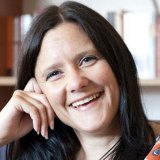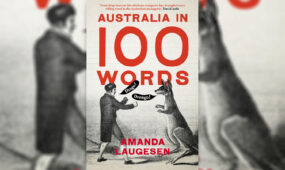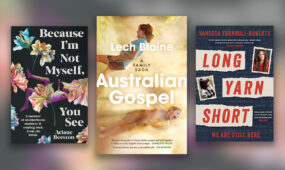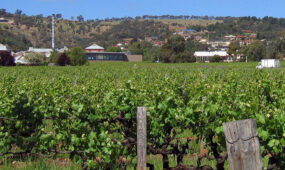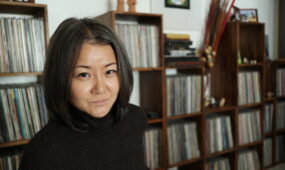Diary of a Bookseller: Customer service in a Covid world
Books & Poetry
While wrestling with the challenges of being a masked bookseller, Jo Case recommends some reads for fans of big stories, science, politics, music and comedy – including one book that eerily captures the feeling of this strange year.

To mask or not to mask: that was the question at the bookshop last Saturday, a day after Nicola Spurrier had been handing out masks in Rundle Mall in the 40C afternoon heat.
Jason, my boss and Saturday sidekick (or more accurately, I’m his sidekick) told me as soon I arrived that I should do whatever made me most comfortable. Which was a relief, as I had come prepared.
I planned to withdraw my mask (beautifully hand-sewn by a worldly-wise Melbourne friend) from my pocket when customers entered. But then the first pair wandered in, smiling amiably, and it felt insulting to put it on in response to their presence. After a few stern internal talking-tos, I gathered my courage and just put it on. But it was so strange to be serving mask-less customers from behind my floral fabric that after a few stilted exchanges, I returned it to my pocket with a sigh.
“Are you okay?” asked Jason, “You know you can wear it.” And he repeated that I should do what makes me comfortable.
“Yeah I know,” I said. “Thanks. I just don’t know how to be my customer-service self like this.” My customer-service self is, generally, a relaxed chatterbox. Open and receptive. Curious but respectful. I’d never actively thought about this, or the way I instinctively access that self every time I start a bookshop shift… until I put on the mask and couldn’t find her.
 The morning rolled on into afternoon, with customers passing under the grapevines from the humid street holding copies of our annual Summer Reading Guide, and mental (or written) lists of who they were buying for, and what they needed.
The morning rolled on into afternoon, with customers passing under the grapevines from the humid street holding copies of our annual Summer Reading Guide, and mental (or written) lists of who they were buying for, and what they needed.
One customer wanted a book for a young woman who’s into essay collections, and I recommended Blueberries by Ellena Savage (Text, $32.99), a favourite from March.
Another wanted a really great novel, preferably with feminist themes and an absorbing “big” story (nothing dystopian, nothing too dark) for her stepmother, who was on the cusp of getting back into reading. After some discussion, she went away with The Dictionary of Lost Words (Affirm, $19.99), the marvellous story of a secret “rogue” dictionary of women’s words, set during the making of the Oxford English Dictionary, as imagined by Adelaide’s own world bestseller, Pip Williams.
 A book for a man into science, who had really liked last year’s book on how octopuses are the closest we’ll come to meeting an intelligent alien? Metazoa: Animal Minds and the Birth of Consciousness by the same author, Peter Godfrey-Smith (William Collins, $32.99) seemed the perfect solution. He looks at how animals are physical beings made up entirely of cells, and yet can think. How did a mind first grow from matter that is the body? At what stage does that clump of cells become a “self”?
A book for a man into science, who had really liked last year’s book on how octopuses are the closest we’ll come to meeting an intelligent alien? Metazoa: Animal Minds and the Birth of Consciousness by the same author, Peter Godfrey-Smith (William Collins, $32.99) seemed the perfect solution. He looks at how animals are physical beings made up entirely of cells, and yet can think. How did a mind first grow from matter that is the body? At what stage does that clump of cells become a “self”?
 Jason got into a nostalgia-steeped conversation with a man who, with his son, owns an iconic café in Byron Bay, where Jason and his parents had once breakfasted on a motorcycle ride. The man was looking for a gift for his “lefty, almost socialist” grandson, who’s into politics, and I butted in – as this is exactly my wheelhouse – to recommend Royce Kurmelovs’ Just Money (UQP, $32.99), with its exploration of robodebt, payday loans, banking traps and how Australia’s system of debt evolved. He decided that sounded just the ticket, along with Jason’s recommendation of Thomas Frank’s People Without Power: The War on Populism and the Fight for Democracy (Scribe, $29.99), a book that shows how everything we think we know about populism is wrong – and declares true populism to be the language of promise and optimism.
Jason got into a nostalgia-steeped conversation with a man who, with his son, owns an iconic café in Byron Bay, where Jason and his parents had once breakfasted on a motorcycle ride. The man was looking for a gift for his “lefty, almost socialist” grandson, who’s into politics, and I butted in – as this is exactly my wheelhouse – to recommend Royce Kurmelovs’ Just Money (UQP, $32.99), with its exploration of robodebt, payday loans, banking traps and how Australia’s system of debt evolved. He decided that sounded just the ticket, along with Jason’s recommendation of Thomas Frank’s People Without Power: The War on Populism and the Fight for Democracy (Scribe, $29.99), a book that shows how everything we think we know about populism is wrong – and declares true populism to be the language of promise and optimism.
 Of course, some customers come in knowing exactly what they want. Copies of Barack Obama’s A Promised Land (Viking, HB, RRP $65; our special price $54.99), the first volume of his presidential memoirs, couldn’t be re-stocked on the shelves fast enough. And I’m not surprised.
Of course, some customers come in knowing exactly what they want. Copies of Barack Obama’s A Promised Land (Viking, HB, RRP $65; our special price $54.99), the first volume of his presidential memoirs, couldn’t be re-stocked on the shelves fast enough. And I’m not surprised.
Not only are many people especially nostalgic for America’s last president after the shock-a-minute reality show of the Trump presidency, front and centre of the news as he insists he won (BIG TIME) the election he just lost… but Barack Obama is a gorgeous writer: articulate, observant and thoughtful. (Dreams from My Father, his memoir of boyhood and adolescence, published before he even ran for president, remains a cherished read for me.) So this promises to be more than your average presidential memoir – not just an eyewitness record, but a great read.
 Jason had great fun telling customers buying the new Nick Cave memoir, A Boy on Fire: The Young Nick Cave, by renowned writer Mark Mordue (HB, HarperCollins, RRP $39.99; our special price $34.99) that it’s an incredible read. An epic Cave fan, he fatefully texted the day before our recent Covid lockdown to say, Having read the first few pages, I just want to close the shop, play some Bad Seeds records and hunker down and read.
Jason had great fun telling customers buying the new Nick Cave memoir, A Boy on Fire: The Young Nick Cave, by renowned writer Mark Mordue (HB, HarperCollins, RRP $39.99; our special price $34.99) that it’s an incredible read. An epic Cave fan, he fatefully texted the day before our recent Covid lockdown to say, Having read the first few pages, I just want to close the shop, play some Bad Seeds records and hunker down and read.
The next day, of course, with all of Adelaide shut in their homes, he did exactly that. I learned something new when Jason told one years-long customer that the one time the dark prince himself came into the shop, he was at home, and co-owner Katherine (who was thrilled last year to serve Florence, of Florence and the Machine) did the honours.
 Katherine and I chatted in the shop last week, on another broiling day, when I left my publishing job early to rush in and get the last copy of a book I’d heard on Conversations with Richard Fidler that day (yes, I am just like every other customer) about a book we both loved and were dying to talk about. Some books are like that. Leave the World Behind, by Rumaan Alam (Bloomsbury, $29.99), eerily captures the feeling of this strange year, as we live on the brink of unfolding disaster, torn between putting everything on hold to deal with it and – as is a very human impulse – simply going on living our lives, as best we can.
Katherine and I chatted in the shop last week, on another broiling day, when I left my publishing job early to rush in and get the last copy of a book I’d heard on Conversations with Richard Fidler that day (yes, I am just like every other customer) about a book we both loved and were dying to talk about. Some books are like that. Leave the World Behind, by Rumaan Alam (Bloomsbury, $29.99), eerily captures the feeling of this strange year, as we live on the brink of unfolding disaster, torn between putting everything on hold to deal with it and – as is a very human impulse – simply going on living our lives, as best we can.
Genuinely terrifying and surprisingly hopeful, Alam’s book starts unassumingly with a well-off, but not filthy rich (white) New York family holidaying at an AirBnB near the Hamptons, when soon into their stay, the high-finance (black) owners arrive in the middle of the night, fleeing a mysterious event that shut down New York. The two families are uncomfortably stranded together, figuring out what happened and what to do next, and how to co-exist. Blending psychological literary thriller and knife-sharp social observation, it’s totally absorbing, and I dare anyone to read it and NOT want to talk about it.
 It might have been because I’d been looking at the new Jerry Seinfeld book, Is This Anything? (Simon & Schuster, HB, RRP $49.99; our special price $39.99), a collection of his favourite material across five decades in comedy (organised by decade), that I finished my bookselling day eating takeaway noodles in bed, watching episode after episode of Comedians in Cars Getting Coffee on Netflix with my husband, who told me how much he loves Seinfeld on one of our early “phone dates”, while I was living in Melbourne and he was… well, here. (That’s how I landed here – in Adelaide and at Imprints, two and a half years ago. A stupidly successful, seemingly pointless, Tinder date during my annual family Christmas visit.) If he didn’t read my column (or at least, he says he does), I could say that this book will be my Christmas gift for him.
It might have been because I’d been looking at the new Jerry Seinfeld book, Is This Anything? (Simon & Schuster, HB, RRP $49.99; our special price $39.99), a collection of his favourite material across five decades in comedy (organised by decade), that I finished my bookselling day eating takeaway noodles in bed, watching episode after episode of Comedians in Cars Getting Coffee on Netflix with my husband, who told me how much he loves Seinfeld on one of our early “phone dates”, while I was living in Melbourne and he was… well, here. (That’s how I landed here – in Adelaide and at Imprints, two and a half years ago. A stupidly successful, seemingly pointless, Tinder date during my annual family Christmas visit.) If he didn’t read my column (or at least, he says he does), I could say that this book will be my Christmas gift for him.
 I finished my bookshop shift, as always, taking photographs for our Instagram account and then lingering long past clock-off time, to browse the shelves and spend my pay, and make my own list of what to buy next. First, I think, will be Raven Leilani’s Luster (Picador, PB, $32.99), glowingly endorsed by Zadie Smith as “brutal and brilliant”, about a young black woman messing up in her dead-end admin job at her all-white office, sleeping with the wrong men, and having failed at the only thing that meant anything to her: painting. And then she meets Eric, a white, suburban, middle-aged archivist with an open marriage his wife “sort of” agreed to, and an adopted black daughter “who doesn’t have a single person in her life who can show her how to do her hair” – and falls into his family.
I finished my bookshop shift, as always, taking photographs for our Instagram account and then lingering long past clock-off time, to browse the shelves and spend my pay, and make my own list of what to buy next. First, I think, will be Raven Leilani’s Luster (Picador, PB, $32.99), glowingly endorsed by Zadie Smith as “brutal and brilliant”, about a young black woman messing up in her dead-end admin job at her all-white office, sleeping with the wrong men, and having failed at the only thing that meant anything to her: painting. And then she meets Eric, a white, suburban, middle-aged archivist with an open marriage his wife “sort of” agreed to, and an adopted black daughter “who doesn’t have a single person in her life who can show her how to do her hair” – and falls into his family.
The other thing I think I’ll do, next time I’m in the shop, is wear my damn mask. Get over myself. Push through the awkwardness and learn how to be my chatty, open, curious self from behind the fabric. Unless, of course, the world dramatically shifts again before then, and we’re looking at a new set of norms and rules. And then, I guess, I’ll adapt to that.
Ah, 2020!
Jo Case is a bookseller at Imprints Bookseller on Hindley Street and an associate publisher at Wakefield Press.
Support local arts journalism
Your support will help us continue the important work of InReview in publishing free professional journalism that celebrates, interrogates and amplifies arts and culture in South Australia.
Donate Here
